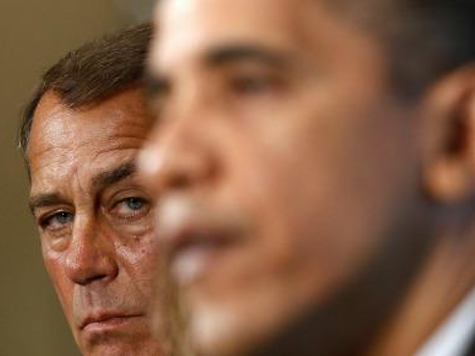The partial shutdown of the federal government is on its third day, but the political fight is effectively over. The GOP has fought to a draw–and, as predicted, the shutdown is now part of a bigger, and more consequential, debt ceiling battle. President Barack Obama himself signaled that when he issued a bizarre warning to Wall Street on Wednesday: CNBC’s question was on the shutdown, but his answer was about default.
A few conservative pundits are wondering about Republican strategy, following allegations by moderates that Sen. Ted Cruz (R-TX) never had a strategy from the start. They worry that the party does not have an endgame for the shutdown. But the President has given them one, by refusing to negotiate over the shutdown and over Obamacare: the endgame is the debt ceiling, which will consume the next two weeks.
Last time around, in 2011, conservatives pushed for a “Cut, Cap, and Balance” plan that would have limited federal spending and deficits for good. That was sidelined, in deference to the leadership and to Democrats, in favor of talks that ultimately ended with the Budget Control Act, a.k.a. the “sequester,” which made cuts to defense and discretionary spending in the event Congress could not agree on a comprehensive deal.
That, in turn, was followed by the “fiscal cliff” negotiations at the end of 2012, which delayed the sequester for two months and raised taxes on the highest earners, preserving the Bush tax cuts for everyone else. The GOP was lucky to get away with that deal, and throughout December 2012 had been constantly reminded of the leverage they lost by agreeing to a debt deal back in 2011 that shifted the focus from spending to taxes.
Now it is the opportunity to make amends, and revive the “Cut, Cap and Balance” (CCB) plan. Conservatives could seize the initiative by indicating their willingness to raise the debt ceiling–and to be somewhat flexible in the amount by which it is to be raised–in exchange for CCB’s effective guarantee that this will be the last debt ceiling fight that Congress and the White House will ever have, so long as they obey the law.
That, plus a continuing resolution to fund the government (with delays to Obamacare’s individual mandate, and an end to its congressional exemptions), should be Republicans’ debt ceiling proposal. And Boehner would be wise to let conservatives lead, as he has done in the Obamacare fight. The GOP’s next move should not be to water down its previous offers to end the shutdown, but to transcend them–before the opportunity is lost.

COMMENTS
Please let us know if you're having issues with commenting.